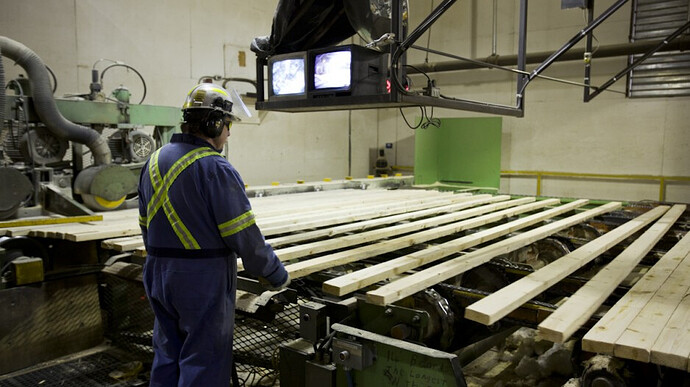The extreme volatility of lumber markets in 2021 and 2022 appear to be in the rearview mirror, with more stable, normal prices going forward this year, predicts Keta Kosman, analyst and owner of Madison Lumber reporter.
Prices for Western spruce-pine-fir (SPF) are up this week to US$446 per thousand board feet, Kosman reports.
That should be good for B.C. sawmills. Over the past year, a number of B.C. sawmills have taken either temporary curtailments or been shuttered for good, due in no small part to high operating costs and a dwindling supply of affordable timber.
“Those mills that have slowed down and been curtailed and been rotating through curtailment are going to come back online,” Kosman predicts. “What I think is that, where we’ve been seeing a lot of these curtailments, especially in the past year, there’s going to be way less of that now.”
Lumber prices increased during the pandemic, thanks to a lot of remodeling and renovations, and then the new housing market picked up. It did so at a time when there were supply challenges, including a dwindling supply of fibre in B.C. and rising costs of operating.
Lumber prices hit all-time record highs of US$1,600 per thousand board feet for Western spruce-pine-fir (SPF) in 2021, and near records of US$1,410 per thousand board feet in 2022.
Kosman noted that B.C. sawmills may have been receiving very high prices for the lumber they were producing, but that they may not have actually produced that much lumber.
“There was not a lot of volume sold,” Kosman said. “For a business, they would rather sell 40 rail cars at $800 than four rail cars at $1,600.”
She also noted that when lumber prices did correct last year, it was very sudden and sharp.
“The correction down was quite sharp,” Kosman said. “When it did correct, it corrected down below where it had been.”
Rising interest rates aimed at tempering inflation have indeed cooled housing prices. But new housing starts are moving up – an indication of fundamental demand for new homes, driven by Millennials.
According to the most recent data for new housing starts in the U.S. in May, total new housing starts were up 22 per cent from April and six per cent from May 2022.
“There’s an underpinning of demand across North America, especially in the U.S., because you have the single largest cohort of first-time homebuyer with the Millennials getting in – a huge number of people coming into the 35-year-old age,” Kosman said. “So there’s a momentum of true demand.”
Although other external factors like wildfires or labour disputes – like the current ongoing strike at B.C. ports – will have an impact on lumber markets, generally speaking it looks like some normalcy has returned for lumber demand and prices.
“We’re looking at where we can say is the new normal level,” Kosman said.
